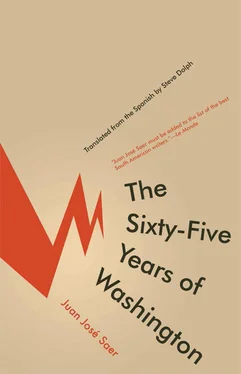— This Botón’s credibility seems to fluctuate considerably, says Leto, somewhat irritated by the continuous corrections he has to make to his general idea of Botón, and by the nagging feeling of having missed the crux of the Mathematician’s story.
— His heart is big like a house. Unfortunately, its size sometimes seems inversely proportional to his intellectual faculties, says the Mathematician, simultaneously severe and tender.
— Isn’t he also kind of a. .? says Leto.
The Mathematician discharges a short, resigned laugh to show that even on the defensive he is willing to get to the bottom of things.
— A liar? he says.
Making a vague gesture with his lips and his shoulders, half-closing his eyes and adopting an enigmatic, ambiguous expression, Leto declines to respond, so the Mathematician presents his opinion: If the descriptor includes even the slightest hint of moral judgment, he rejects it emphatically and pre-emptively. Otherwise — and here the Mathematician’s timbre turns slightly pitched, a kind tone and singsong rhythm, as they also say — if it implies his inclination toward fantasy, his oversensitivity to bearing the steady bitterness of reality, his well-intentioned descriptions of things from an angle that will be most pleasant, calming, and enlightening to his interlocutor, his lack of, um, education and somewhat, um, limited culture, his malnourished capacity for rational thought, not to mention his intemperate consumption of gin, which don’t exactly contribute to a clarification of his ideas and more than anything don’t allow any certainty as regards the events to which he is an eyewitness or even a protagonist — if you bear all of these criteria in mind, the Mathematician continues, you could say that any statement from Botón, whatever its contents, presents itself a priori as slightly problematic. This said, he — the Mathematician, no? — isn’t the only one who thinks that, among all his traits, his ingenuousness and simplicity are what make Botón so lovable. Consider instead — or along the same lines maybe — the example of Noca, who might be regarded as a virtuoso of every variety or genre , and straightening the fingers on his left hand one by one, to mark his enumeration, the Mathematician intones: exaggeration, omission, perjury, fabulation, contradictory statements — and having used all of his fingers, he folds them back against his palm, except the index, which ticks the sixth variant — slander — of approaches that are contrary to the truth, and then he resumes straightening his fingers one by one: chimeras, systemic distortions for obscure mercantile reasons, flagrant misinterpretations, pseudologia fantastica morbosa , etc., etc., says the Mathematician, circling both hands in the air to indicate the infinite varieties of falsification at Noca’s disposal.
And then he falls, as they say, silent, and lets his arms drop to his sides. Two boys sitting in a doorway, seven or eight years old, gaze at a spot somewhere on the opposite sidewalk so intently that Leto looks toward it, not seeing anything, as does the Mathematician, who has not seen the boys yet but, intrigued by Leto’s curious look, passes his over the same spot without seeing anything but the one- or two-story houses and the gray pavement covered with bright morning light. They are so abstracted, Leto observes, that they don’t even see them approach or notice when anyone else walking down the sidewalk passes them, though the proximity to the government district generates a slight increase in movement along the streets. Just then the Mathematician recognizes — and is recognized by — two young men coming toward them on the opposite sidewalk, and they exchange, across the street where just then two cars are crossing, a quick greeting that consists in raising a hand, shaking their head a little, and smiling vaguely, a passing acknowledgment that dissolves in the bright air as quickly as it forms, so fast that Leto, because no verbal exchange follows, doesn’t even notice it, intrigued as he is by the boys’ indistinct but nevertheless attentive gaze. But as they pass alongside them and leave them behind, and he hears their conversation— I spy, I spy. What. A thing. What. Shiny. What color . — he suddenly understands the boys’ extreme attention. He would have liked to hear the thing’s color too, in order to find, somewhere in the spot, what they were talking about, but they’ve gone too far from the boys, and the one who was supposed to give the color stalls, possibly on purpose, in order to conceal the direction, disorienting the one who has to find the object and drawing out the game a little more. I spy, I spy. What. A thing. What. Shiny. What color , Leto thinks and, with somewhat childish disenchantment, can’t stop himself from looking again toward the opposite sidewalk, motivating another pointless look from the Mathematician who, because he was distracted by his greeting didn’t pay attention to the conversation, ends up slightly annoyed. Deliberately, Leto doesn’t provide an explanation. Washington’s notorious sentence, which the Mathematician must have referred to just before he stumbled over the guardrail, supposing that the allusions shared by the Mathematician and Tomatis were engineered to exclude him from the sphere where they moved effortlessly between the trivium and the quadrivium , as the Mathematician would say, the famous sentence that Leto continues to suspect was never spoken by Washington, sanctions his lack of explanation for his insistent interest in looking at the vague spot somewhere on the opposite sidewalk, prompted, so to speak, by a childish whim born, it’s not clear why, in the fissures of his soul — a problematic object if there ever was one, as they say, and which yours truly — just now, no? — was saying seems not translucent but murky. And in that climate of what you might call tenuous opposition, they reach the corner.
The landscape, to put a word to it, has changed completely. The small, private houses with their bronze nameplates and balconies over the sidewalk give way, as they say, to the Plaza de Mayo, bordered, on its four sides, by the cathedral, the courts, the Jesuit college, the capitol. From the long, three- or four-story buildings surrounding the plaza, suppliers of law, power, justice, and religion enter and exit with folders, briefcases, papers, alone or in small groups, men and women, the litigators, the faithful, and the public servants. Several pass, most likely on an errand from the curia to the courts, from the courts to the seat of government. Many cross, in different directions, the red brick paths of the plaza between the green flowerbeds bordered by bitter orange trees, rubber trees, or palms. The sky, bright blue, without a single cloud, spreads, you could say, over the plaza. The Mathematician slows down.
— This is my stop, he says.
Surprised, Leto looks at him, searching his expression for any resentment of his recent behavior. But the Mathematician’s wide smile, and the sincere look that meets his, calm him.
— I have to drop the press release off over there, he says, vaguely pointing somewhere in the city beyond the plaza, the capitol, and the courts. And then, satirizing himself and the Students Association: It’s not enough to travel through Europe. You’ve got to publish it too.
— I’m going straight, says Leto.
— Shame we missed the party, no? says the Mathematician.
— They didn’t invite me, says Leto.
— It must have slipped their minds. Or probably they thought they didn’t have to, says the Mathematician.
— So strange, giving him a ham, says Leto.
— It’s Washington’s favorite, says the Mathematician. But not to worry. In a couple of visits Tomatis will leave him with just the bone.
Читать дальше












